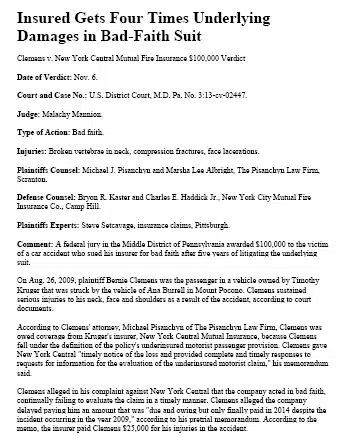Clemens v. New York Central Mutual Fire Insurance $100,000 Verdict
Date of Verdict: Nov. 6.
Court and Case No.: U.S. District Court, M.D. Pa. No. 3:13-cv-02447.
Judge: Malachy Mannion.
Type of Action: Bad faith.Injuries: Broken vertebrae in neck, compression fractures, face lacerations.
Plaintiffs Counsel: Michael J. Pisanchyn and Marsha Lee Albright, The Pisanchyn Law Firm, Scranton.
Defense Counsel: Bryon R. Kaster and Charles E. Haddick Jr., New York City Mutual Fire Insurance Co., Camp Hill.Plaintiffs Experts: Steve Setcavage, insurance claims, Pittsburgh.
Comment: A federal jury in the Middle District of Pennsylvania awarded $100,000 to the victim of a car accident who sued his insurer for bad faith after five years of litigating the underlying suit.
On Aug. 26, 2009, plaintiff Bernie Clemens was the passenger in a vehicle owned by Timothy Kruger that was struck by the vehicle of Ana Burrell in Mount Pocono. Clemens sustained serious injuries to his neck, face and shoulders as a result of the accident, according to court documents.
According to Clemens’ attorney, Michael Pisanchyn of The Pisanchyn Law Firm, Clemens was owed coverage from Kruger’s insurer, New York Central Mutual Insurance, because Clemens fell under the definition of the policy’s underinsured motorist passenger provision. Clemens gave New York Central “timely notice of the loss and provided complete and timely responses to requests for information for the evaluation of the underinsured motorist claim,” his memorandum said.
Clemens alleged in his complaint against New York Central that the company acted in bad faith, continually failing to evaluate the claim in a timely manner. Clemens alleged the company delayed paying him an amount that was “due and owing but only finally paid in 2014 despite the incident occurring in the year 2009,” according to his pretrial memorandum. According to the memo, the insurer paid Clemens $25,000 for his injuries in the accident.
In its defense memorandum in the bad-faith case, New York Central disputed the severity of Clemens’ injuries. The memo also argued that Clemens had not been wearing his seatbelt, which would constitute contributory negligence under New York law. However, the insurance company never made a claim as to which state’s law applied, according to Clemens’ memorandum.
Although the insurance policy was from the state of New York, the court found that Pennsylvania law applied.
The seatbelt defense does not apply in Pennsylvania law, Pisanchyn said, and was therefore an invalid defense. The court then allowed Clemens’ expert witness, Steve Setcavage, to testify that New York Central acted with bad faith toward Clemens, according to Pisanchyn.
A jury of eight returned a verdict of $100,000 for Clemens after nearly four hours of deliberation, according to Pisanchyn. The firm then filed a petition for attorney fees, interests and costs, “in accordance with the Federal Rules of Civil Procedure” in bad-faith claims, the petition said.
According to the petition, Clemens argued the compounding interest rate would bring the verdict amount close to $175,000. The petition also sought attorney fees and costs of more than $1.1 million.
A call to defense counsel Bryon Kaster was not returned.






